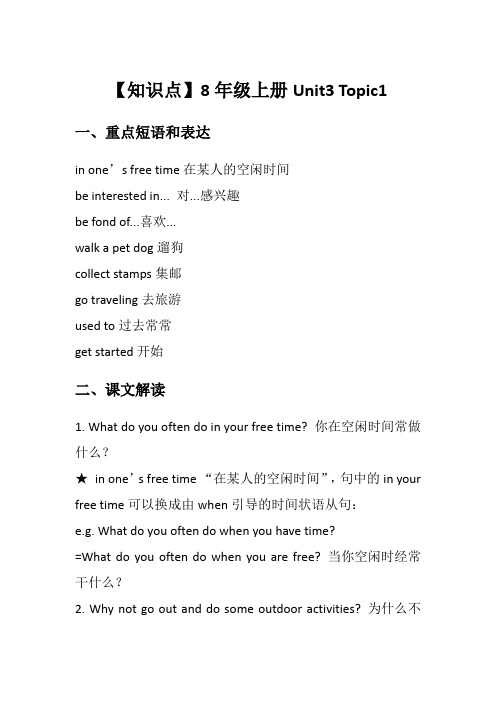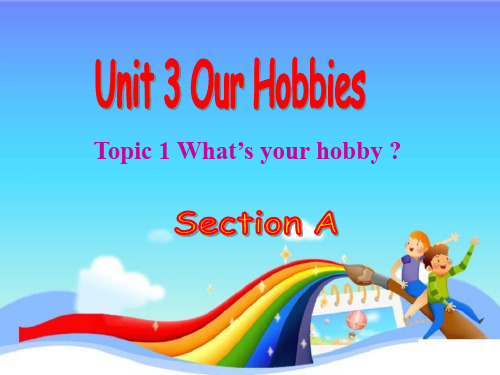仁爱八上英语unit3topic1
Unit 3 Topic 1 Section A-八年级英语上册课件(仁爱版)

Key points
Helen: What do you often do in your free time? in one’s free time
在某人的空闲时间 Wen Wei: I often go fishing. It’s my favorite hobby. And I also enjoy reading stories and
1b Listen to 1a and choose the correct answer.
What are Helen and Wen Wei talking about ? A. Going to the movie theater. B. Their hobbies. C. Outdoor activities.
poems.
4. I like _s_l_e_e_p_i_n_g__.
6. I am fond of__a_c_ti_n_g__.
7. I __p_r_e_f_e_r___
playing soccer.
While-listening 1a Look, listen and say.
Helen: What do you often do in your free time? Wen Wei: I often go fishing. It’s my favorite hobby.
be interested in doing sth. 喜欢做某事 recite poems 背诗
Make dialogs.
A: What’s your hobby? B: I like/love/enjoy/prefer/am fond of/am interested in .......
【知识点】仁爱版英语8年级上册Unit3 Topic1

【知识点】8年级上册Unit3 Topic1一、重点短语和表达in one’s free time在某人的空闲时间be interested in... 对...感兴趣be fond of...喜欢...walk a pet dog遛狗collect stamps集邮go traveling去旅游used to过去常常get started开始二、课文解读1. What do you often do in your free time? 你在空闲时间常做什么?★in one’s free time “在某人的空闲时间”,句中的in your free time可以换成由when引导的时间状语从句:e.g. What do you often do when you have time?=What do you often do when you are free? 当你空闲时经常干什么?2. Why not go out and do some outdoor activities? 为什么不做一些户外运动?★why not “为什么不…”,相当于why don’t you,后接动词原形。
★do outdoor activities 做户外运动do indoor activities 做室内运动3. Maybe I need a change. 或许我需要改变一下。
★maybe和may be都表示“也许,或许”的意思,区别如下:①maybe是副词,只能作句子中的状语。
e.g. Maybe he is a student. 或许他是个学生。
e.g. ---Is he 6 years old? 他6岁了吗?---Maybe. 也许吧。
②may be则是两个词,应该分开来看。
may是情态动词,本身不能算作谓语动词,即不能作句子的谓语,使用时必须后接谓语动词;而be则是系动词,可以作谓语。
e.g. He may be a student. 或许他是个学生。
精编仁爱英语八年级上册Unit3 Topic1知识点和练习(有答案)

精编仁爱英语八年级上册Unit3 Topic1知识点和练习(有答案)G8 Unit 3: Our HobbiesTopic 1: What's Your Hobby?1.What do you usually do in your free time?In one's free time。
one can XXX.2.I love reciting XXX.One can express their hobbies using verbs such as enjoy。
like。
love。
be fond of。
or be interested in。
followed by a noun。
pronoun。
or gerund.3.Why not try some outdoor activities?One XXX。
indoor activities XXX.4.Maybe I need a change.Maybe is an adverb that means "perhaps" or "possibly." May be is a verb phrase that means "might be" or "could be."5.XXX.To walk a pet dog means to take it for a walk on a leash.6.It's great fun.XXX。
One can have fun doing something that they enjoy。
XXX.XXX: What are your hobbies?Wen Wei: Well。
what's your hobby?XXX: I love dancing and I'm also a movie fan。
Unit 3 Topic 1 What’s your hobby ?仁爱版八年级英语上册

walk a pet dog
listen to music climb mountains collect stamps fly kites go swimming go traveling plant flowers
go fishing read stories
Phrases:
11.朗诵诗 12.遛狗 13.爬山 14.集邮 15.放风筝 16.去游泳 17.去旅行 18.种花
New Words:
1.业余爱好 hobby
2.背诵,朗诵 recite
3.诗
poem
7.宠物 8.收集 9.种植
pet collect plant
4.可能,也许 maybe 10.喜爱的 fond
5.对…感兴趣 be interested in
6.喜欢
be fond of
Phrases:
1.遛狗
2. I am interested in
__p_l_a_y_in_g__b_a_sk_e_t.ball
1. I love __s_i_n_g_in_gand
playing the guitar.
3. I enjoy ___d_a_n_c_intog
music.
4. I like
__sl_e_e_p_in_g_.
New Words:
1.业余爱好 hobby 7.宠物 pet
2.背诵,朗诵 recite 8.收集 collect
3.诗
poem
9.种植 plant
4.可能,也许 maybe 10.喜爱的 fond
5.对…感兴趣 be interested in
6.喜欢
be fond of
New Words:
仁爱版八年级上册Unit3Topic1What’syourhobbySectionA优秀教学案例

三、教学策略
(一)情景创设
1.教师通过展示不同兴趣爱好相关的图片、视频等多媒体资源,引导学生进入学习情境,激发学生对主题的兴趣。
2.教师设计真实的交流场景,如模拟面试、角色扮演等,让学生在具体情境中运用所学知识,提高交际能力。
仁爱版八年级上册Unit3Topic1What’syourhobbySectionA优秀教学案例
一、案例背景
本案例背景以仁爱版八年级上册Unit3Topic1What’syourhobbySectionA为基础,探讨如何通过课堂教学,培养学生的兴趣爱好,提高他们的英语听说读写能力,以及合作和创新精神。本节课的主要内容是介绍个人的兴趣爱好,通过询问和回答问题,学生能够熟练运用本课核心句型进行交流,提高他们的语言表达能力。同时,通过小组合作完成任务,培养学生的团队协作能力和创新思维。在教学过程中,教师应以学生为中心,关注学生的个体差异,创设真实、有趣的学习情境,激发学生的学习兴趣,帮助他们掌握所学知识。
(四)总结归纳
1.教师引导学生回顾本节课所学的知识和技能,帮助他们进行知识梳理和归纳。
2.教师通过提问和总结,强调本节课的重点和难点,确保学生能够理解和掌握。
3.教师给出本节课的课堂作业,让学生巩固所学知识,提高实际应用能力。
(五)作业小结
1.教师提醒学生按时完成作业,并强调作业的重要性,培养学生的自律和责任感。
3.教师鼓励学生提出问题,培养学生的批判性思维和独立思考能力,使学生在探究过程中不断成长。
(三)小组合作
1.教师将学生分成小组,根据小组特点和能力,分配不同难度的任务,使学生在合作中互补、共进。
2.教师指导学生明确分工,鼓励学生发挥各自优势,培养学生团队协作能力和责任意识。
仁爱版英语八上Unit3Topic1《What’syourhobby》(SectionC)说课稿

仁爱版英语八上Unit 3 Topic 1《What’s your hobby》(SectionC)说课稿一. 教材分析仁爱版英语八上Unit 3 Topic 1《What’s your hobby》(Section C)是一篇关于个人爱好的阅读材料。
通过描述不同人物的不同爱好,引导学生学会询问和介绍个人的爱好,培养他们开口交际的能力。
本节课主要通过阅读理解,让学生掌握相关词汇和句型,并能运用到实际生活中。
二. 学情分析八年级的学生已经掌握了基本的英语语法和词汇,具备一定的阅读理解能力。
对于本节课的内容,他们容易产生共鸣,因为爱好是每个人都会有的。
但部分学生可能在表达能力上还存在一定的问题,需要教师在教学中给予指导和鼓励。
三. 说教学目标1.知识目标:学生能掌握描述个人爱好的相关词汇和句型,如“What’syour hobby?”, “I like playing basketball.”等。
2.能力目标:学生能通过阅读理解,提高自己的英语阅读能力。
3.情感目标:学生能积极参与课堂活动,大胆表达自己的爱好。
四. 说教学重难点1.重点:描述个人爱好的词汇和句型的运用。
2.难点:如何准确、流畅地表达自己的爱好。
五. 说教学方法与手段1.任务型教学法:通过设置各种任务,让学生在完成任务的过程中,自然地学会描述个人爱好的词汇和句型。
2.情境教学法:创设各种情境,让学生在真实的语境中,学会表达自己的爱好。
3.小组合作学习:通过小组讨论,培养学生的合作精神和团队意识。
六. 说教学过程1.导入:教师通过提问,引导学生谈论自己的爱好,激发学生的学习兴趣。
2.阅读理解:学生独立阅读课文,回答相关问题,教师给予解答和指导。
3.新课导入:教师引导学生学习描述个人爱好的词汇和句型。
4.课堂实践:学生进行小组讨论,用所学的词汇和句型描述自己的爱好。
5.总结提升:教师对学生的表现进行评价,总结课堂所学。
七. 说板书设计板书设计如下:What’s your hobby?•I like playing basketball.•She enjoys listening to music.•He spends his free time reading books.八. 说教学评价教学评价主要通过以下几个方面进行:1.学生课堂参与度:观察学生在课堂上的表现,是否积极参与、主动发言。
仁爱版八年级英语上册Unit3Topic1SectionA课件

• 1. 掌握粗体部分的新单词,以及词组 • 2. 学会表达自己的爱好的词组。 • 3. 记熟表达自己兴趣爱好的句型,
• New words and phrases: • hobby [`hɔbi]业余爱好 poem [`pəuim]诗 • recite poems 背诗 • maybe [`meibi:]adv.也许 pet[pet]宠物 • walk a pet dog 遛狗 • collect [kə`lekt]收集 collect stamps集邮 • plant [plɑ:nt] n.植物; vt.种植 • plant flowers / plant trees 种花、植树 • be interested in 对……感兴趣 • be fond of 喜欢
4
E. climb mountains
F. fly kites
G. go traveling H. go swimming 6
2
3
5
7
8
3a
Match the pictures with the phrases. Then listen to the
sentences and number the pictures. 录音3a-P56
playing the guitar.
3. I enjoy __d_a_n_c_i_ngto
music.
4. I like
_s_l_ee_p_i_n_g_.
5. I like ______
preoceimtisn.g
Collecting different expressions with similar meanings will help you in your talking and writing.
仁爱版八年级上册英语教学设计:Unit3Topic1SectionC

3.教师要及时检查作业,了解学生的学习情况,并进行针对性的辅导。
(三)学生小组讨论
1.教学活动:学生分成小组,针对以下问题展开讨论:
a. What are the good manners in public places?
b. Can you give some examples of impolite behavior in public places?
c. How can we improve our behavior in public places?
2.对话编写:以小组为单位,编写一段关于公共场合行为规范的对话,要求运用本节课所学的句型和词汇。各小组将对话表演给全班同学,提高学生的合作意识和口语表达能力。
3.阅读理解:请学生阅读本单元的阅读材料,完成相应的练习题,并针对文章内容提出至少两个问题,培养阅读理解和批判性思维能力。
4.家庭作业:请学生观察家人在公共场合的行为,记录下至少三个良好的行为习惯和三个需要改进的行为。在下节课上分享,以培养学生的观察力和实际应用能力。
2.听力理解能力:本章节的听力材料涉及不同场景下的行为规范,要求学生能够理解并评价人物行为。
-教学设想:采用逐步推进的听力训练方法,先让学生听懂关键词汇,再逐步提高至句子和语篇的理解。同时,提供听力策略的指导,如预测、关键词定位等。
3.阅读理解与批判性思维:要求学生能够从阅读材料中提取信息,对人物行为进行评价,并表达自己的观点。
b.句型学习:通过师生互动、小组活动等形式,学习一般现在时描述人们的行为和习惯,如:“He is always polite to others.”、“They behave well in public places.”等。
- 1、下载文档前请自行甄别文档内容的完整性,平台不提供额外的编辑、内容补充、找答案等附加服务。
- 2、"仅部分预览"的文档,不可在线预览部分如存在完整性等问题,可反馈申请退款(可完整预览的文档不适用该条件!)。
- 3、如文档侵犯您的权益,请联系客服反馈,我们会尽快为您处理(人工客服工作时间:9:00-18:30)。
Unit3 My HobbyTopic 1 I love collecting stamps一.重点词汇•hobby 爱好vacation假期painting 绘画friendship友谊knowledge 知识daily 每日的whether 是否such as 例如used to do sth. 过去常常做某事take a bath洗澡be interested in 对……感兴趣go dancing 跳舞go boating 划船play volleyball 打排球swimming 游泳drawing 画画collecting stamps 集邮collecting coins 收藏硬币•listening to pop music 听流行音乐•listening to classical music 听古典音乐•listening to symphony 听交响乐•walking in the countryside 在乡间散步二.重点句型:• 1.Wow! So many stamps!(Page 53)哇,那么多的邮票!本句意为:There are so many stamps. so many意思是“那么多”,so much意思也是“那么多”。
如:1)There are so many flowers. Or: So many flowers!这里有这么多的花。
•2)There is so much water on the table. Or: So much water!桌子上有那么多的水。
2. We can learn a lot about people, places, history, and special times from stamps. (Page 53)通过这些邮票我们可以学到许多关于人文、地理、历史和特殊时代的知识。
a lot “许多、大量”,用在动词后,同very much。
如:1)She had told me a lot about how to learn English well.她告诉我许多有关怎样学好英语的方法。
2)Thanks a lot.非常感谢。
•另外,a lot of 和lots of 的意思也是“许多、大量”,要用在名词前,在肯定句中常代替much,many。
在口语中尤其如此。
如:There are a lot of / lots of history books in the room.屋里有许多历史书。
•There are a lot of / lots of history books in the room.屋里有许多历史书。
•There is still a lot of / lots of snow on top of the house.房上仍有许多雪。
We have had a lot of / lots of fruits. 我们吃过许多水果。
•总结:• a lot of和lots of之间没有多大区别,都可以与可数名词和不可数名词连用。
与不可数名词连用时,动词用单数,与可数名词连用时,动词用复数。
见上述例句。
• 3.Would you like to collect any of these things? (Page 53)你想集下面这些东西吗?would you like to +动词原形,表示“想要……”如:1) Would you like to have a cup of coffee? 你想要一杯咖啡吗?2)Would you like to have something to drink?你想要点喝的吗?•any 用在疑问句、条件从句中,可以翻译为“什么”、“一些”。
如:1)Are there any letters for me? 这有我的信吗?2)If you have any trouble, please let me know. 如果你有什么困难,请告诉我。
• 4. What things do you love collecting? (Page 53)你喜欢集什么东西?love + doing表示“喜欢、爱好”,也可以用like+ doing表示。
如:1)I love listening to the music.我爱好听音乐。
2)I love skating.我喜欢溜冰。
• 5.I am interested in playing sports. (Page 54)我对运动感兴趣。
be interested in (doing) sth. “对……感兴趣”如:1)I am interested in reading books.我对读书特别感兴趣。
2)Jack is interested in football.杰克对足球很感兴趣.• 6.What do you often do in your spare time? (Page 55)在你的业余时间里面你都做些什么啊?in one’s spare time “在业余时间”“在闲暇之际”,也可用in one’s free time替换。
如:1)I shall do it in my spare time. 我会在我的业余时间做这件事。
2)In my free time I often go to the movies.在闲暇之际,我常去看电影。
7. I often go fishing. (Page 55)我经常去钓鱼。
go + doing表示“去做某事”go +v-ing结构很常用,多用于体育活动和业余娱乐活动。
如:•1)Let’s go fishing next Sunday.下星期天我们去钓鱼吧。
2)Are you going hiking this weekend?这个周末你打算去远足吗?另外还有:go hunting 去打猎 go shooting 去射击 go swimming 去游泳go bathing 去沐浴 go shopping 去购物 go climbing 去爬山•8.And I do a lot of reading. (Page 55)我通常都是阅读一些书籍。
在英语中有不少由“do + doing”的结构,表示“干某事”。
如:散步 do some walking do a lot of walking读书 do some reading do a lot of reading洗衣服 do some washing do a lot of washing买东西 do some shopping do a lot of shopping清扫 do some cleaning do a lot of cleaning9.I am a movie fan. (page 55)我是一个电影迷。
fan(运动、电影等)狂热爱好者。
如:a film / football / star fan同时,fan作为名词还有“风扇”的意思。
如:electric fan 电扇。
•10.I also rent VCDs and watch them at home. (Page 55)我也租一些VCD在家看。
watch “观看、注视”。
如:1) I like to watch TV.我喜欢看电视。
2) Are you going to play or watch?你将参加比赛还是只是去看看?•11.Why not go out and do some outdoor activities? (Page 55)为什么不走出去做一些户外运动呢?这是一个省略句,全句可以说成Why shall we not go out and do some outdoor activities?常在口语中使用,用来征求对方的意见或表达建议。
使用这种句子必须要有上下文,如:•1)Why not meet at the school gate?我们在校门口见面好吗?2)Why not run a little faster?为什么不跑快一点呢?some“一些、几个”,用在疑问句中, 表示希望得到肯定回答。
如:1)Would you like to give us some good advice?请给我们一些好的建议好吗?2)Would you like some coffee or tea?请问,你是想喝咖啡还是茶?•12.Maybe I need a change. (Page 55) 或许我需要改变。
maybe “也许、可能、大概”。
如:1)Maybe he will come, maybe he won’t.也许他来,也许他不来。
2)—Is that true?那是真的吗?—Maybe, I am not sure.也许,我也不敢肯定。
•13.My interests are changing all the time. (Page 56) 我的兴趣爱好总是在不断地改变。
all the time“总是、一直”。
如:1)Why are you playing all the time? 你为什么总是玩啊?2)Look at these monkeys, they are jumping all the time.看看这些猴子,它们一直跳个不停。
•14. And I wasn’t interested in sports at all. (Page 56)我对运动一点兴趣都没有。
not...at all “一点也不……”;“全然不”。
如:1)I didn’t mind it at all. 我一点也不在意。
2)—Thank you for helping me.谢谢你帮助我。
—Not at all.没关系。
3)He didn’t know that at all. 他对此事一无所知。
•15. But now, my hobbies are sports, like soccer and swimming. (Page 56) 但是现在我的爱好是体育,比如足球和游泳。
like “像……,好比……”。
如:1)He swims very quickly like a fish.他游泳非常地快,像一条鱼。
2) The cake is round like a moon.这块蛋糕是圆的,就像月亮一样。
•16. I never miss any important soccer games. (Page 56)我从未错过任何一场重要的足球比赛。
never “未曾、从未”,表示否定。
如:1)I have never met him before.我以前从未见过他。
